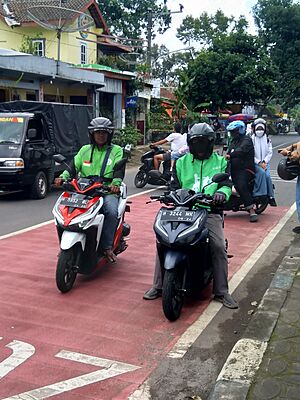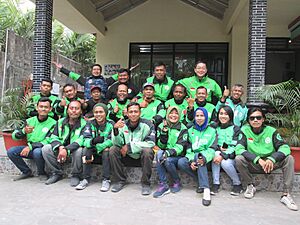Gojek facts for kids

Gojek's current logo, nicknamed as "Solv", used since 13 December 2022
|
|
| Subsidiary | |
| Industry | |
| Founded | 5 October 2010 |
| Founders |
|
| Headquarters |
Jakarta, Indonesia
|
|
Area served
|
|
|
Key people
|
|
|
Number of employees
|
3,000 (2019) |
| Parent | GoTo (2021–present) |
Gojek is a big technology company from Indonesia. It started in 2010 as a call center. This center helped people connect with motorbike taxis and delivery services. In 2015, Gojek launched its app. It offered four main services: GoRide, GoSend, GoShop, and GoFood.
Today, Gojek is known as a "super app." This means it offers more than 20 different services. It helps millions of users in Indonesia, Singapore, Thailand, and the Philippines. Gojek was the first Indonesian company to be called a "unicorn." This means it was valued at over $1 billion. Later, it became a "decacorn," valued at over $10 billion. Fortune magazine even listed Gojek as one of the "50 Companies That Changed the World."
In May 2021, Gojek joined forces with another big Indonesian company, Tokopedia. They created a new company called GoTo. Many large companies like Google, Facebook, and PayPal have invested in Gojek.
Contents
How Gojek Started

The name Gojek comes from "Ojek." This is the Indonesian word for motorbike taxis. Gojek began in 2010 with just 20 motorbike drivers. The Gojek app was launched in January 2015. In less than two years, the app was downloaded almost 30 million times.
Gojek was started by Nadiem Makarim and Michaelangelo Moran. Nadiem noticed that motorbike drivers often waited a long time for customers. Customers also wasted time looking for a ride. Gojek was created to solve this problem. It made it easier for drivers and riders to find each other. This also helped drivers earn more money. Michaelangelo Moran designed Gojek's first well-known logo.
By May 2018, the app offered 18 services. Two more services for online content were planned. This brought the total to 20 on-demand services. Being an Indonesian company helped Gojek understand the local market. It also helped them work with local rules. In 2020, Gojek launched GoStore. This service helps small businesses easily set up online shops.
Gojek's Growth and Funding
Gojek started getting big investments in late 2014. Its fast growth in 2015 attracted more money from investors. In August 2016, Gojek raised $550 million. Big Indonesian companies like Astra International and Blibli.com invested. Global tech companies like Google and Tencent also put money into Gojek.
By February 2018, Gojek was valued at about $5 billion. This was more than all other transportation companies in Indonesia combined. In May 2018, Gojek announced it would invest $500 million to grow internationally. In January 2019, the company raised another $2 billion. Its total value reached $9.5 billion. In March 2020, Gojek received $1.2 billion in funding. Its goal was to reach a $10 billion valuation. In June 2020, WhatsApp (from Facebook) and PayPal also invested in Gojek.
Company Mergers and Partnerships
Gojek grew quickly, leading to many partnerships and acquisitions. In 2016, Gojek bought two engineering companies in India. This helped them set up a development center in Bangalore, India. They also bought other Indian companies.
In 2017, Gojek bought Loket.com, an Indonesian online ticket company. The same year, it bought three financial technology (fintech) companies. These were Kartuku, Midtrans, and Mapan. This helped Gojek expand its payment services. In January 2019, Gojek bought a large part of Coins.ph, a mobile wallet company. Gojek later sold its share in Coins.ph in 2022.
In June 2019, Gojek bought AirCTO, an AI recruiting platform in India. In March 2020, Gojek bought Moka. Moka is a top provider of point-of-sale systems in Indonesia. In December 2020, there were talks about Gojek joining with Grab. This would have been a huge merger in Southeast Asia.
In February 2021, Gojek was close to merging with Tokopedia. On May 17, 2021, Tokopedia and Gojek officially merged. They formed a new company called GoTo. GoTo became one of Southeast Asia's largest technology companies. In July 2021, AirAsia bought Gojek's business in Thailand. Gojek then received a small share in AirAsia's super app business.
Working with Other Companies
In 2016, Gojek started working with Blue Bird, a big taxi company in Indonesia. That same year, Gojek launched Go-Car for car rides. It also launched Go-Auto for on-demand mechanic services. By August 2016, Gojek was Indonesia's first online transportation system.
Gojek uses Google Maps for its GPS. It also partners with entertainment companies like Google Play. For bill payments, it works with companies like AEON Credit Service and Suzuki Finance Indonesia. Gojek also partners with the national electricity provider PLN and the national health insurance BPJS Kesehatan.
In February 2019, Garuda Indonesia talked with Gojek about delivering products. This would help deliver goods across Indonesia's many islands. In August 2019, Wall Street Journal reported that Gojek had talks with Amazon. Amazon was interested in investing in Gojek. This would help Amazon use Gojek's delivery network in Indonesia.
In September 2020, Gojek partnered with Unilever. They worked together through GoToko. GoToko is a digital platform for small and medium businesses. It connects them with big consumer goods companies like Unilever. This helps small businesses get products at good prices.
Gojek's Impact
Gojek has made a big difference to Indonesia's economy. It has added an estimated $732 million each year. This comes from the income of its driver partners. Small and medium businesses that join Go-Food also add money to the economy.
New Look for Gojek
On July 22, 2019, Gojek showed off a new logo. Its new icon, called "Solv," showed that Gojek was more than just a ride-hailing service. It had become a super app with many ways to make life easier.
Changes to Services
In December 2019, Gojek decided to stop most of its lifestyle services. These were under its GoLife brand. Services like GoLaundry and GoDaily stopped by the end of 2019. GoFix, GoGlam, and Service Marketplace stopped by mid-January 2020. Gojek kept GoClean and GoMassage because they were very popular. However, due to the COVID-19 pandemic, Gojek stopped all remaining lifestyle services on July 27, 2020. Gojek also closed its GoFood Festival around the same time.
Where Gojek Operates
Gojek works in many cities across Indonesia. It also operates in rural areas.
Gojek launched its ride-hailing service in Singapore on January 10, 2019. This was part of its plan to offer more choices in Singapore's ride-hailing market. Gojek Singapore appointed Lien Choong Luen as its General Manager in February 2019.
International Offices
Gojek has an office in Singapore. This office focuses on data science and engineering. It also has an engineering facility in Bangalore, India. This office was created after Gojek bought C42 and CodeIgnition. It works on product, engineering, and design.
In May 2018, Gojek announced plans to invest $500 million. This was for expanding into Vietnam, Thailand, Singapore, and the Philippines. They started with ride-hailing services. Then, they planned to offer more services, just like in Indonesia. Local teams run these companies, with Gojek providing technology support.
Gojek's Services
Gojek offers many different services through its app:
- Go-Pay: This is a popular e-wallet service in Indonesia. It allows users to pay for things using their phone.
- GoRide: This was the first online motorbike taxi service in Indonesia. Gojek has over 1,000,000 drivers for this service.
- Go-Car: This service lets you request a car ride.
- Go-Blue Bird: You can use the Gojek app to request a Blue Bird taxi. These taxis use a meter for fares.
- GoFood: This is a fast food delivery service. It works with over 250,000 restaurants in Indonesia.
- Go-Mart: This service lets you shop for groceries from supermarkets listed in the Gojek app.
- Go-Shop: Similar to Go-Mart, but it lets you buy items from any shop, even if it's not listed in Go-Mart.
- Go-Send: This is a courier service. You can send items and documents within a delivery zone.
- Go-Box: This service is like Go-Send, but for moving larger items. It uses pickup trucks or bigger trucks.
- Go-Tix: This service lets you buy tickets for entertainment events through the app.
- Go-Med: This service delivers medicine. It works with HaloDoc's "Apotik Antar" feature.
- Go-Pulsa: You can top up your phone credit using this service. You pay with Go-Pay.
- Go-Bills: This service helps you pay electricity bills, buy electricity tokens, and pay health insurance.
- Go-Points: This is a loyalty program. Users earn points for each transaction and can get rewards.
- Go-Play & Go-Studio: Gojek also has a video streaming service called Go-Play. Go-Studio is their production house for creating content. GoPlay officially launched in September 2019.
- Go-Pertamina: This service delivers fuel to users from the nearest gas station. It partners with Indonesia's oil company Pertamina.
- Go-Nearby: This service helps Gojek customers find Go-Food restaurants nearby.
- GoRide and GoCar Protect+: These services offer extra safety features for users.
Awards and Recognition
Gojek has received many awards. In 2017, Fortune magazine ranked Gojek number 17 on its "56 Companies that Changed the World" list. Gojek was the only company from Southeast Asia on this list. In 2019, Gojek was on the list again, jumping to number 11. It is the only Southeast Asian company to be included twice.
Other international awards include the Top Performer in ASEAN Award 2017. Gojek also won the Entrepreneur of The Year award from Ernst & Young. Nationally, Gojek has been recognized as one of the most valuable Indonesian brands. It also won awards for being a top brand in online transportation.
Sponsorships
Gojek has sponsored sports events. It sponsored the Liga 1 (a football league) from 2017 to 2018. Gojek also sponsored Persib Bandung, a football club, starting in 2019. Gojek was also a local sponsor for the 2023 FIBA Basketball World Cup in Indonesia.
Working at Gojek
Employees
Gojek has over 3,000 employees. This includes 210 engineers in its Jakarta offices. It also has a data science office in Singapore and an engineering facility in India. In May 2018, Gojek announced a $500 million investment to expand in Southeast Asia. This expansion added to its partners. As of May 2018, Gojek had over 1,000,000 drivers. It also had 125,000 restaurants for Go-FOOD and 30,000 professionals for its lifestyle services.
Sadly, due to the COVID-19 pandemic, Gojek had to let go of 430 employees in June 2020.
Workplace
Gojek's main office in Jakarta used to be an old mall. It was changed into a modern workspace. It has a cinema, a playroom with arcade games and pool tables. There are also cafes and nap rooms for employees.
See also
- Grab
- List of unicorn startup companies
 | Janet Taylor Pickett |
 | Synthia Saint James |
 | Howardena Pindell |
 | Faith Ringgold |



